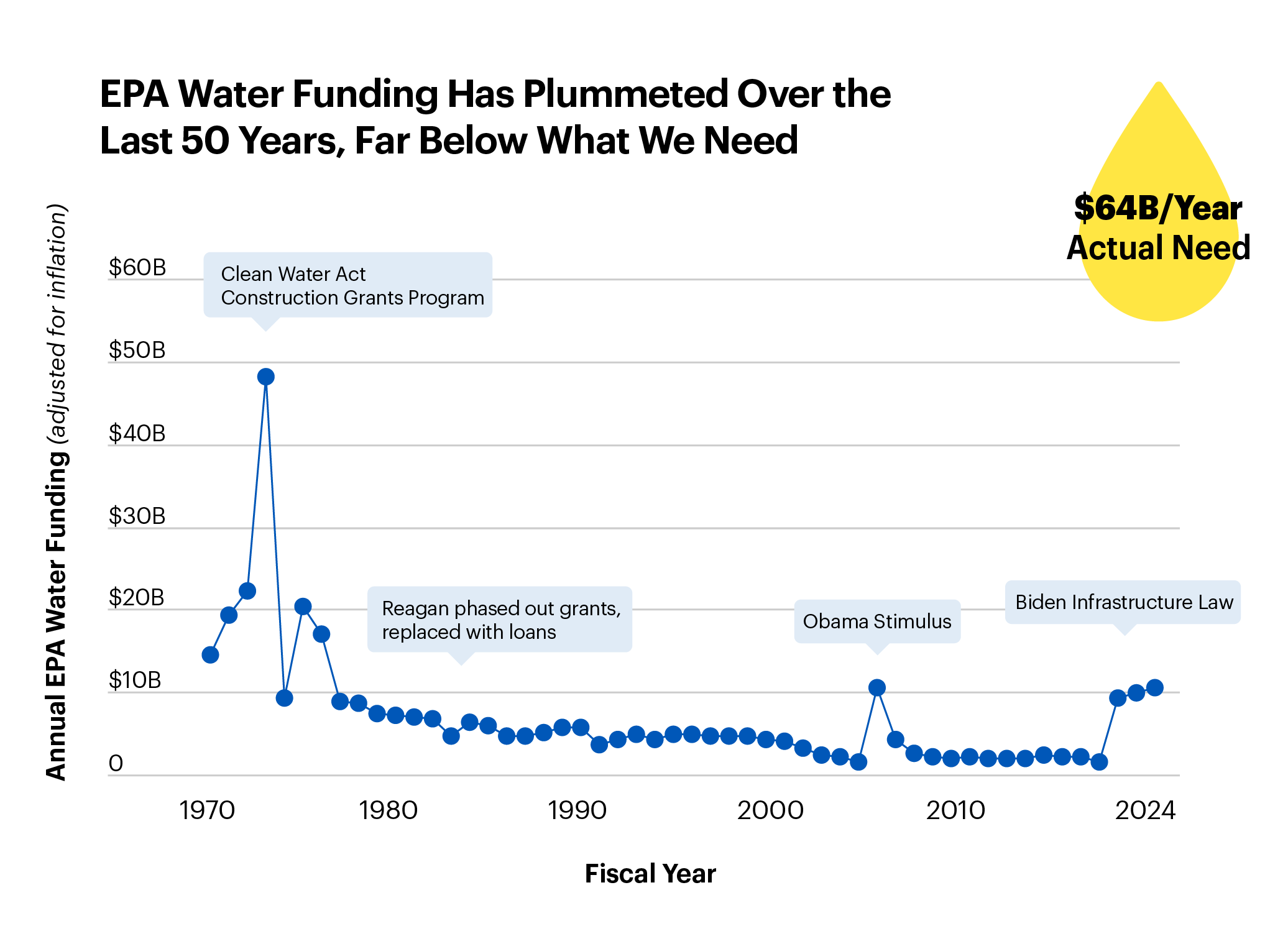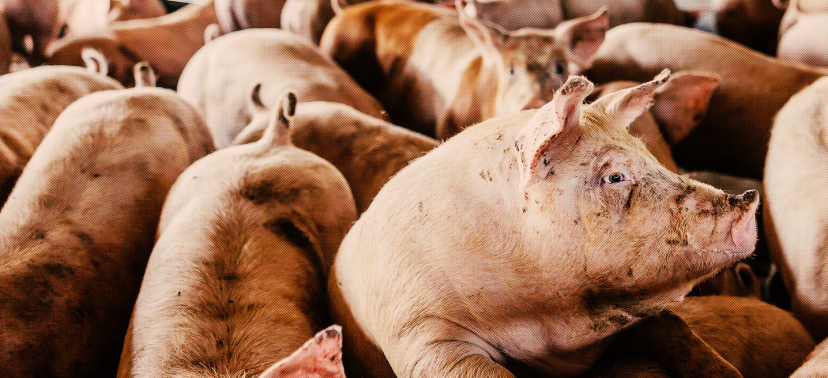News & OpinionWater
by Mary Grant and Mia DiFelice
In June, House Republicans introduced a spending bill that would cut federal funding for water infrastructure by an outrageous 25%. If passed, this would mark the lowest level of funding in more than 15 years for the Drinking Water and Clean Water State Revolving Funds, the main sources of federal support for water infrastructure.
These cuts come at a time when our country’s water infrastructure needs are greater than ever. Outdated wastewater systems spill and leak hundreds of billions of gallons of raw sewage each year, contaminating waterways with pathogens and toxic chemicals. Every two minutes, a water main breaks in the U.S., wasting more than 6 billion gallons of drinking water every day.
Funding for maintenance, repairs, and upgrades are essential to protect community health and provide safe, affordable water for everyone. And in recent needs assessments, the Environmental Protection Agency put a price tag on all necessary upgrades: $1.3 trillion.
So why is this price tag so massive? What are the costs of rolling back support? And how can our leaders change course?
Aging, Crumbling Water Systems Leads to Toxic Water and Unaffordable Bills
For decades, federal water funding has fallen by the wayside. After a peak in the 1970s, it has plummeted, while needs have continued to climb. Since 2012 — the last time the EPA released a wastewater assessment — clean water needs have grown by 73%. Stormwater needs specifically increased five-fold.

The 2021 Bipartisan Infrastructure Law provided the biggest jump in federal water funding in decades, at $50 billion. Yet, that covers just 4% of the $1.3 trillion we need.
Now, crumbling infrastructure is causing many water systems to hemorrhage drinking water. From Michigan to Mississippi, Georgia to Alabama, many communities are losing more than half of their drinking water from aged, damaged, leaking pipes — some at rates as high as 80%. This makes water bills more expensive, as the costs of buying and treating water are built into rates even though that water never reaches families.
On top of that, toxic water contamination — including lead in service lines and PFAS “forever chemicals” from corporate polluters — are exacting huge health harms and economic costs on communities nationwide. Without federal support, more families will continue to be poisoned. And costs of remediation and treatment will fall on them through higher water bills.
These higher rates are caused and compounded by historical discrimination and underfunding in communities of color. At the same time, since low-income families spend a higher proportion of their income on water bills, many families are forced to choose between buying medicine, food, or water.
The U.S. is already experiencing a water affordability crisis. Over the last 15 years, bills have ballooned three times the rate of inflation, while household incomes have fallen. Under the status quo, higher water bills will lead to more service shutoffs, denying people their right to clean water.
Failing Wastewater Infrastructure Endangers Human and Environmental Health
On top of drinking water, many towns and homes currently face failing wastewater and stormwater infrastructure, exposing families to major health risks. Failing infrastructure spills pollution into our waterways, including raw sewage and the toxic chemicals and pathogens that it contains. This harms drinking water sources, destroys aquatic life, and makes waters too contaminated to swim, boat, or fish.
While most U.S. families depend on centralized sewer systems, more than one in five rely on home septic systems that pose particular problems. Failing systems can pollute the environment and contaminate water supplies — even groundwater — endangering human health. But the cost of purchasing and maintaining a septic system is unaffordable for many low-income rural families.
Many people in the U.S. don’t have access to safe wastewater disposal at all, leaving them to pipe waste directly into the environment. This makes them even more vulnerable to water contamination and illness. In Wilcox County, Alabama, homes that must straight-pipe their waste release an estimated 10 billion viruses and 19 billion parasites every day.
Maintaining and upgrading storm and wastewater infrastructure is paramount to ensuring human and environmental health. But communities around the country are struggling to keep up with the pace of repairs.
Climate Change Is Raising the Stakes for Our Water Infrastructure
All of these issues will get worse as climate change intensifies. Storms, flooding, and sea-level rise will destroy or submerge many water systems. Climate-fuelled disasters can lead to power outages that disrupt treatment, strangling communities’ access to clean water.
Moreover, heavy rainfalls will lead to more sewage overflows. For example, in 2012, the storm surge of Hurricane Sandy released 11 billion gallons of raw and partially treated sewage into waterways and city streets.
For U.S. water and wastewater systems, climate adaptation costs alone are projected to reach nearly $1 trillion by 2050. And without quick, bold action, climate disasters will continue to threaten our infrastructure and access to clean water. We need not only adaptation — we also need to fight climate change by transforming our food and energy systems away from industrial agriculture and fossil fuels.
We Must Pass the WATER Act to Fund Our Water Infrastructure
While the Biden administration has improved federal water funding through the Bipartisan Infrastructure Law, it is far from enough. Meanwhile, House Republicans are jeopardizing people’s access to clean water by slashing existing programs.
The U.S. needs nothing less than a dedicated trust fund for water infrastructure needs. Fortunately, we have a bill in Congress that would create just that.
The Water Affordability, Transparency, Equity, and Reliability (WATER) Act, introduced by Reps. Bonnie Watson Coleman and Ro Khanna and Sen. Bernie Sanders, provides permanent federal funding at levels that ensure clean, safe water for every community nationwide. It will:
- Take steps to remove contaminants like lead and PFAS “forever chemicals”;
- Provide grants directly to low-income communities, which are most at risk for shutoffs due to unaffordable bills;
- Create well-paying, local jobs and train and support water workers; and
- Safeguard water funding by creating a trust fund that provides support at the level the EPA identifies as necessary in its needs assessments.
From climate change to unaffordable rates to pollution from aging infrastructure, communities face threats to water access on so many fronts. We cannot let such a dire issue get entangled in Congress’s annual appropriations battles. To defend community health and everyone’s right to water, we need bold legislation that preserves support year to year.
It’s time to pass landmark water legislation for the 21st century: the WATER Act. Our nation’s water systems need dedicated federal commitment to keep the promise of clean, safe water for everyone.
This year, our Water Action Volunteer Team is fighting for policies that will defend our right to clean, affordable water. Join our efforts!


FACTORY FARMS MAKE US SICK
Make a gift to ban factory farms ~and have it MATCHED $2-to-$1!

